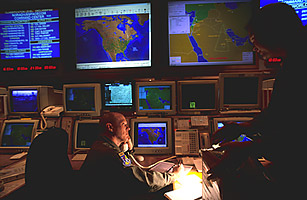لقد اصبح لاسرائيل اقوى شبكة انذار مبكر فى المنطقه فبالاضافه الى الرادار الامريكى من طارز x band الذى سيتم تركيبه قريبا تحت اشراف امريكى هناك ايضا فى صحراء النجف العراقيه رادار اخر من نفس الطارز مداه 1500 كيلو متر لرصد اى طائره او صاروخ ينطلق من ايران ويغطى سماء اسرائيل ويرصد حتى النحله .......
دوكما قال خبير اسرائيلى فبوش سيعطينا اى شئ مقابل عدم ضرب ايران
فعلا فعلها الغبى نجاد وحقق لهم الالاف العصافير بحجر واحد من صنعه Israelis Wary of a US Radar Base in the Negev
By
Tim McGirk and Aaron J. Kein/Jerusalem Thursday, Oct. 02, 2008

Cheyenne Mountain's NORAD, the central collection and coordination center for a worldwide system of satellites, radars, and other early warning systems watching for threats to North American security from both aircraft and ballistic missiles.
George Steinmetz / Corbis
When a contingent of U.S. soldiers opens a radar facility on a mountaintop in the Negev desert next month, Israel will for the first time in its 60-year history have a permanent foreign military base on its soil. And despite the early warning that the American radar would provide
if Iran launches a missile attack on Israel, some senior Israeli officials are nonetheless wary about its presence. Complained one top official, "It's a like a pair of golden handcuffs on Israel."
From its mountain perch in Har Keren, the U.S. radar will be able to monitor the take-off of any aircraft or missile up to 1,500 miles away — giving Israel a vital extra 60-70 seconds to react if Iran fired a missile, Israeli military sources told TIME. Israel has its own radar system trained on Iran, but it's range is much shorter. Still, some see several drawbacks for Israel in the radar, and blame Defense Minister Ehud Barak for requesting its deployment in Israel without consulting anyone other than his chief of staff. Some in the upper echelons of the Israeli Defense Force fear that although the radar will enhance Israel's protection against Iran, it may also open up Israel's own military secrets to the Americans.
The radar will allow the U.S. to keep a close watch on anything moving in Israeli skies, "even a bee", says one top Israeli official who asked not to be identified. The U.S. may be a close ally, but Israel nonetheless has aviation secrets it would rather not share. "Even a husband and wife have a few things they'd like to keep from each other," explains this source. "Now we're standing without our clothes on in front of America."
Israel will have no direct access to the data collected by the radar, which looks like a giant taco. It will only be fed intelligence second hand, on a need-to-know basis, from the Americans — unless the radar picks up an immediate, direct attack on Israel, Israeli sources claim. And Israeli officials expressed concern that the radar's installation may anger Moscow, since its range will enable the U.S. to monitor aircraft in the skies over southern Russia. When the U.S. stationed anti-missile radar and interceptor systems in Poland and the Czech Republic — ostensibly directed at a future Iranian threat, although the Russians believe their own missile capability is its real target — Moscow warned those countries that the move could result in their being added to the target list of Russia's missiles.
Israeli military sources say that Barak requested the radar from U.S. Secretary of Defense Robert Gates in July, after U.S. requests to station such a system in Turkey and Jordan were rejected. Barak was eager to acquire the advantage of the early warning that the system would provide in the event of a possible Iranian attack. But with the Russians already peeved at Israel for having
had military advisers inside Georgia when war broke out over South Ossetia, the radar's deployment in Israel, say officials, might make Moscow even more likely to
supply Iran and Syria with its highly-accurate SA300 anti-aircraft missile batteries.
The top-secret X-band radar will be staffed by around 120 American technicians and security guards in the Negev, say Israeli military sources. But Israeli planning and air force officials are perturbed that Defense Minister Barak did not carry out any evaluation og the radar's possible impact on Israeli military operations before approving it. For one thing, Israeli defense experts are worried that waves from the X-band radar might throw off the accuracy of a new Gil anti-tank missile also being tested in the Negev. "The Bush Administration is in the mood to give us anything, as long as we don't attack Iran," gripes one senior official. "So why did we take this radar?"
http://www.time.com/time/world/artic...846749,00.html